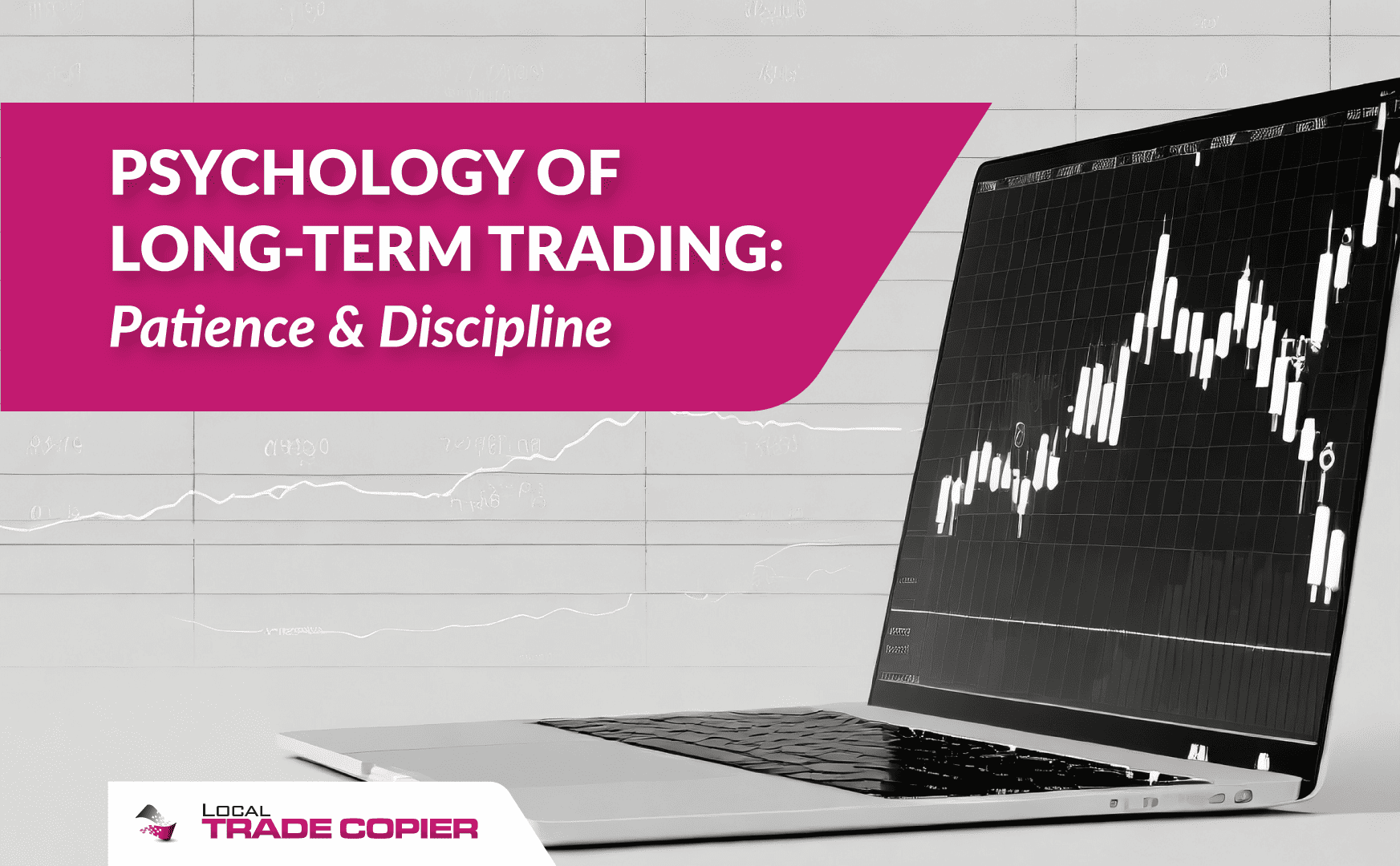
Mastering Market Psychology: The Virtue of Patience in Automated Trading with MT4/MT5 CopyTrader

Mastering Market Psychology: The Virtue of Patience in Automated Trading with MT4/MT5 CopyTrader

Long-term trading isn’t just about buying and selling assets; it’s a strategic approach that involves holding onto investments for an extended period. This method requires a different mindset, focusing on long-term market trends rather than short-term fluctuations. It’s like setting sail on a journey where patience and foresight are your guiding stars, aiming for sustained growth rather than quick gains. Long-term trading allows investors to capitalize on the inherent stability of markets over extended periods, providing a different perspective compared to day trading or short-term strategies.
Table of Contents
- Understanding the Psychology Behind Long-Term Trading
- Patience: The Key to Long-Term Success
- Discipline: Building Blocks of Consistency
- Overcoming Psychological Challenges
- Conclusion
- FAQ’s
- 1. How long should I hold positions in long-term trading?
- 2. Can emotions affect long-term trading decisions?
- 3. Is it necessary to have a strict trading plan in long-term trading?
- 4. What role does risk management play in long-term trading psychology?
- 5. How can I improve my patience as a trader?
- Related posts:
Disclaimer: This post includes affiliate links
If you click on a link and make a purchase, I may receive a commission at no extra cost to you.
Understanding the Psychology Behind Long-Term Trading
Importance of Patience
Patience in trading is akin to a steady hand guiding a ship through unpredictable waters. It’s the ability to wait for the right moment, resisting the allure of instant gratification. In the fast-paced world of markets, patience acts as a shield against impulsive decisions. It allows traders to weather storms, letting opportunities unfold naturally. It’s the silent force behind successful long-term strategies, offering the clarity needed to navigate market fluctuations with composure and foresight.
Role of Discipline
Discipline in trading is like the compass guiding a traveler through uncharted territories. It’s the adherence to a set of rules and strategies, providing structure and consistency to trading decisions. This steadfast approach ensures traders stay on course, even amidst market uncertainties. Discipline acts as a shield against emotional reactions, helping traders stick to their well-thought-out plans and avoid impulsive moves. It cultivates a mindset of resilience, enabling traders to stay focused on long-term goals, ultimately paving the way for success in the financial markets.
Patience: The Key to Long-Term Success
Defining Patience in Trading
Patience in trading is a deliberate art—a conscious decision to wait for the opportune moment. It’s not about inactivity but rather about strategic restraint, resisting the urge to react impulsively to market fluctuations. Patience involves holding onto a position with confidence, allowing time for strategies to unfold and market conditions to align favorably. It’s the ability to endure temporary setbacks while keeping sight of long-term goals, akin to nurturing a seed with the belief in its eventual growth into a tree.
Benefits of Patient Trading
Patient trading offers a myriad of advantages in the financial landscape. It empowers traders to navigate market volatility with resilience, allowing them to ride out short-term fluctuations without succumbing to emotional impulses. This approach enables the identification of long-term trends, often overlooked by those seeking quick gains. By exercising patience, traders can capitalize on opportunities that align with their strategies, minimizing the impact of market noise and fostering a more strategic and less reactive approach. Ultimately, patient trading cultivates a mindset conducive to sustained growth and reduced risk exposure.
Discipline: Building Blocks of Consistency
The Concept of Discipline in Trading
Discipline in trading embodies a structured approach—a commitment to predefined rules and strategies. It’s the backbone that reinforces consistent decision-making, irrespective of market fluctuations. This concept involves sticking to a well-thought-out plan, cutting losses when necessary, and allowing profitable trades to flourish. Discipline is not merely about following guidelines but also about controlling emotions, ensuring that trading decisions are rational and based on strategic reasoning rather than impulsive reactions. It forms the cornerstone of a trader’s reliability and consistency in navigating the unpredictable terrain of financial markets.
Ways to Cultivate Discipline
Cultivating discipline in trading involves a deliberate and continuous effort. One effective method is to establish clear and realistic goals, creating a roadmap that guides trading decisions. Maintaining a detailed trading journal helps track progress, analyze past decisions, and learn from successes and failures. Consistent practice and sticking to a routine reinforce discipline, helping traders stay focused and committed to their strategies. Additionally, regularly reviewing and adjusting trading plans based on market dynamics nurtures adaptability and reinforces disciplined behavior in response to changing conditions.
Overcoming Psychological Challenges
Dealing with Impulse and Emotions
Navigating the realm of trading involves managing a rollercoaster of emotions. Dealing with impulse and emotions requires a blend of self-awareness and self-control. It’s about recognizing when emotions like fear, greed, or excitement start to influence decisions and consciously stepping back to assess the situation objectively. Techniques like mindfulness and emotional regulation help traders regain balance and make rational choices rather than succumbing to impulsive reactions. It’s a continual process of acknowledging and managing emotions to maintain a clear and focused mindset amidst the ebbs and flows of the market.
Strategies for Psychological Stability
Maintaining psychological stability in trading involves adopting various strategies to withstand the emotional rollercoaster. Implementing effective risk management techniques acts as a safety net, reducing the impact of potential losses on emotions. Allocating dedicated time for analyzing trades, rather than reacting impulsively, fosters a rational approach. Seeking guidance from experienced mentors or joining trading communities provides valuable insights and emotional support. Moreover, incorporating techniques like meditation or mindfulness aids in maintaining mental clarity and resilience, ensuring traders can navigate the markets with a balanced and stable mindset.
Conclusion
In the intricate realm of long-term trading, psychology emerges as a significant determinant of success. The fusion of patience and discipline forms the bedrock upon which traders build their strategies. Through this journey, we’ve unveiled the profound impact of these psychological elements on trading decisions. Patience, the art of waiting for the right moment, and discipline, the commitment to predefined rules, stand as pillars guiding traders through market uncertainties.
FAQ’s
1. How long should I hold positions in long-term trading?
Ans. Long-term trading involves holding positions for weeks, months, or even years, depending on your strategy and market conditions.
2. Can emotions affect long-term trading decisions?
Ans. Absolutely. Emotions like fear and greed can lead to impulsive decisions, impacting long-term trading outcomes.
3. Is it necessary to have a strict trading plan in long-term trading?
Ans. Yes, a well-defined trading plan helps maintain discipline and guides decisions during market fluctuations.
4. What role does risk management play in long-term trading psychology?
Ans. Effective risk management techniques contribute significantly to maintaining psychological stability during volatile market phases.
5. How can I improve my patience as a trader?
Ans. Practicing mindfulness, setting realistic expectations, and staying informed about market trends can aid in enhancing patience in trading.
Related posts:
- Position Trading: Long-Term Trading Strategies
- Most Effective Strategies for Managing Risk in Forex Trading
- Day Trading: The Basics and How to Get Started
- Popular Forex Trading Strategies For Successful Traders
Also read:
- [New] 2024 Approved Enhance Your ASMR Experience with Top-Tier Mics
- [New] The Meme Mechanic Generating Online Engagement Through Videos for 2024
- [Updated] Broadcast Easily 3 Steps to Post MP3 on YouTube for 2024
- [Updated] Premier Accessible Stopwatches
- Boost Your Conversions: Building Irresistible Email Signup Forms, Detailed Tips & Techniques with MassMail Demo
- Comparing Returns: Which Yields Higher Earnings - Software Development Vs. Web Services Ventures
- Discover Pope Benedict XVI's Official Email via MassMail: Enhanced Communication with Secure Software
- Easy Trade Duplication: Local Copier Now Supports DXTrade with Seamless MT4 Copy Transfers via Mt4Copier
- Full Guide to Hard Reset Your Xiaomi Redmi 13C 5G | Dr.fone
- How to Restore Recently Deleted Files From Trash in Windows 11/10/8/7
- How to Stop Google Chrome from Tracking Your Location On Google Pixel 8? | Dr.fone
- In 2024, The Artisan's Approach Expert Color Alteration Tactics
- Mastering the Art of Safeguarding Virtual Environments: Discover [Sicher] VM Security Techniques
- MosaicMind Pro Unleashing Creative Potential
- SATA SSDにIDE HDDを簡単にアップグレードする方法 - 一歩ずつ解説
- Seamless Cross-Platform Music Migration: Transferring Tunes From Android to iOS Devices
- The Trader's Guide to Winning Mentality: Leveraging Trade Copiers on MT4 & MT#5 for Enhanced Swing Trading Results
- Top Complimentary Digital Assets for Creative Makers - Updated List | MassMail
- Übertragung Von Musik Auf Den Neuen iPhone Modellen Ab iOS 15, 14 Bis Einschließlich 12 Und 11 – Führen Sie Diese 7 Lösungen Aus
- Title: Mastering Market Psychology: The Virtue of Patience in Automated Trading with MT4/MT5 CopyTrader
- Author: Stephen
- Created at : 2025-02-26 16:23:54
- Updated at : 2025-03-04 00:12:36
- Link: https://win-extraordinary.techidaily.com/mastering-market-psychology-the-virtue-of-patience-in-automated-trading-with-mt4mt5-copytrader/
- License: This work is licensed under CC BY-NC-SA 4.0.